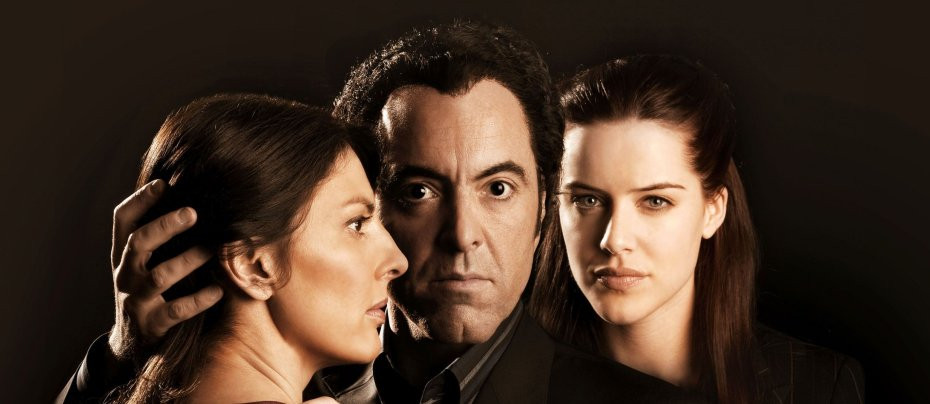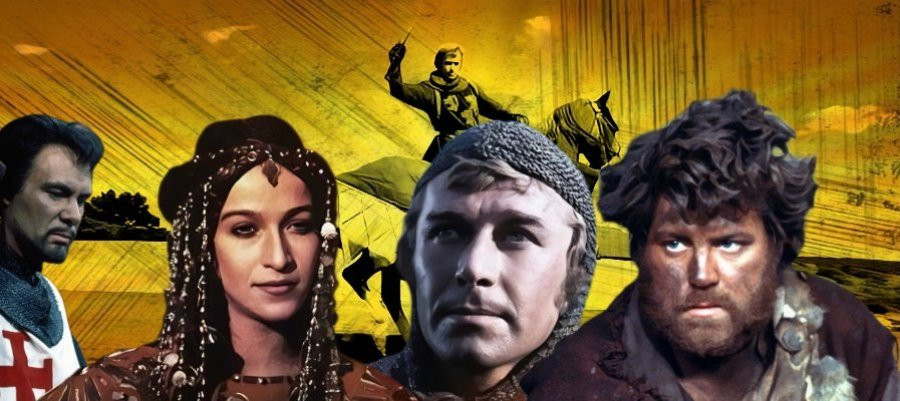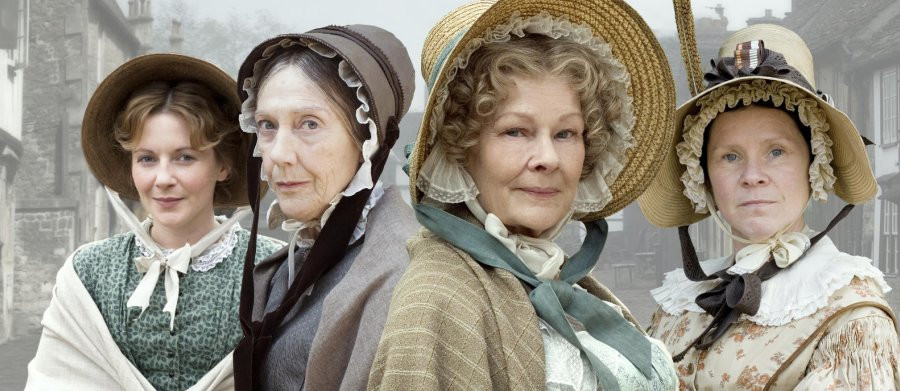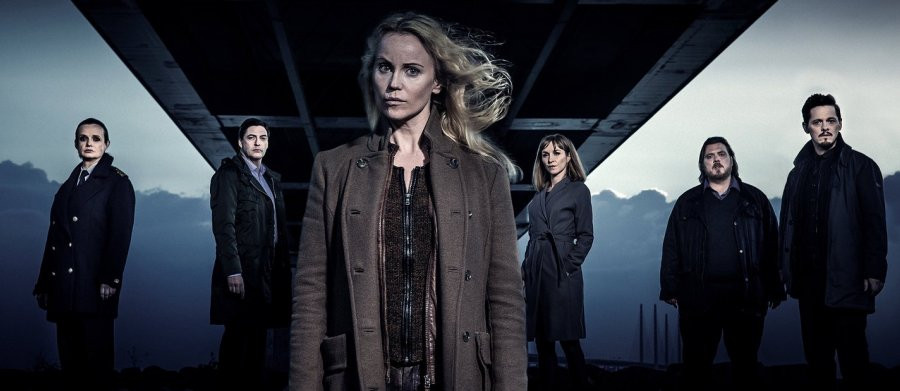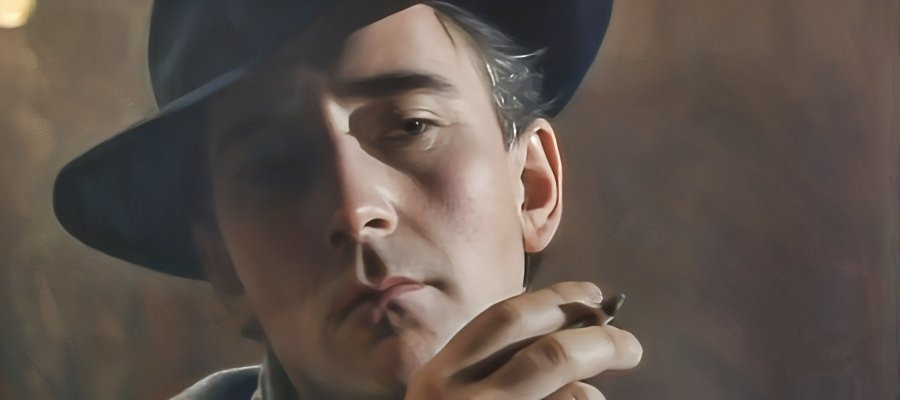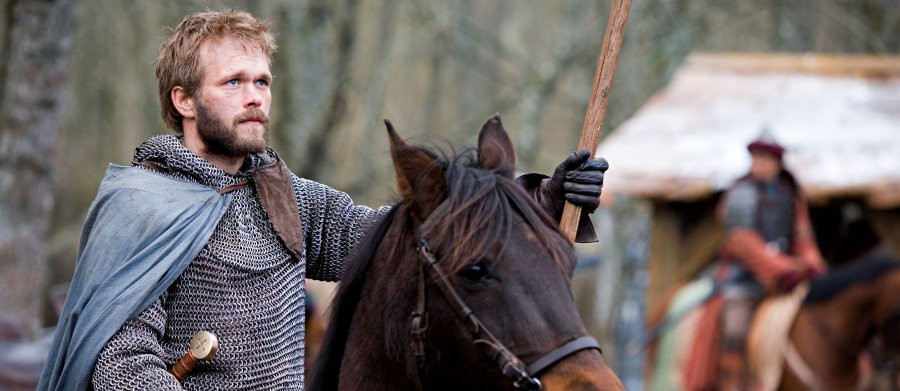
Arn: The Knight Templar
2007 - SwedenOne might have an interesting philosophical debate on whether Arn the Knight Templar counts as a television series, even if that is what it has become. The eponymous Arn started life in a trilogy of novels by Jan Guillou, who also wrote the 'Commander Hamilton' novels which are very popular in Sweden - Hamilton, Sweden's answer to James Bond, having been played by Stellan Skarsgard and Peter Stormare, among others, in Swedish films.
With this pedigree, it was no surprise that Arn got his own feature film, 'Arn the Knight Templar.' In fact he got two, the sequel, 'Arn: the Kingdom at Road's End,' being filmed in anticipation of its success. This made it the most expensive Swedish film production of all time - and it shows, because the money is clearly there on the screen.
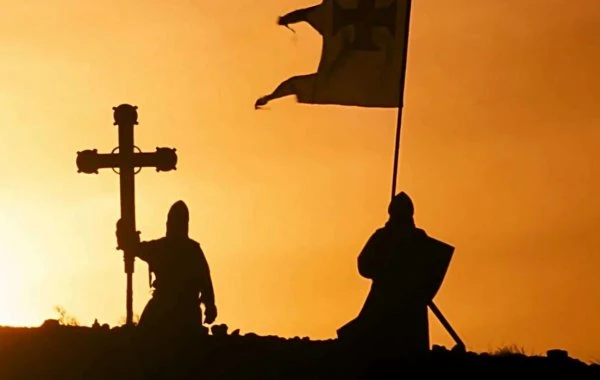
The two films were edited into one for international release. Two years later they were edited again, and expanded slightly, into a six-episode television series, titled simply 'Arn' in Sweden. It is the television series that is the subject of this review, but it is interesting to compare it with the English subtitled version of the film, because it shows the superiority of television as a medium in telling a complicated story. A world that is unfamiliar to most viewers is given that little bit of extra space that is crucial to establish itself without the need for clunky exposition. The whole thing flows a lot more smoothly.
Arn lives in 12th Century Sweden, which is closer to Sweden of the Viking period than today's Sweden. Conversion to Christianity has taken the edge off some of the old Viking attitudes, and the Church has brought some of the benefits of Christian civilisation, notably reading and impressive stone buildings, but Sweden is still a divided land where petty Kings and powerful clans fight for survival. While the restraint imposed by Christian morality is an important factor in 'Arn the Knight Templar,' the murder of a King on Church ground shows that its hold is far from absolute. Old habits die hard.
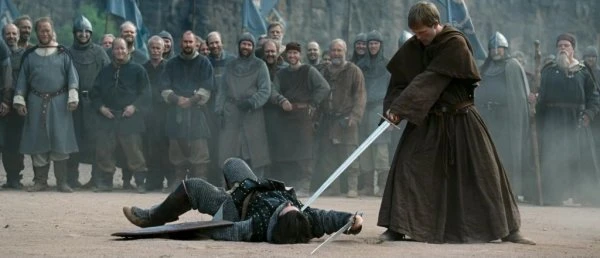
Arn is born into an influential clan that has to tread carefully between competing contenders for the Throne. When he seems almost certain to die after a childhood accident, his mother dedicates him to God if he recovers. He does, so he is sent to an Abbey where he learns to read - a rare accomplishment in those days. However, it is soon obvious that he is not cut out for the monastic life, and a friendly monk with a military past is also allowed to teach him archery, riding, and swordsmanship. Our hero turns out to be ambidextrous, which gives him a useful advantage with a sword, at least in Medieval times.
His unsuitability for Holy Orders is rather confirmed by his impregnating Cecilia, the beautiful daughter of a neighbouring landowner. For this, in a rather unlikely plot device, they are both sentenced to twenty years doing penance - Arn with the Knights Templars in the Holy Land, Cecilia in a ghastly nunnery. In reality, girls getting pregnant outside marriage was by no means unusual even then, the Church had no direct authority to impose punishment, and was in any case generally relaxed about it so long as the parties married subsequently. None of that matters because the important point was to get Arn in the Knights Templars.
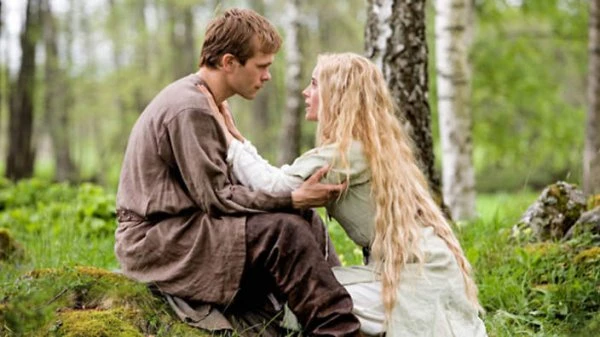
The combination of Arn's fighting skill and monastic education makes him a natural fit with the elite warrior-monks of the Crusades, and he rises rapidly through their ranks. He also befriends the great Muslim ruler Saladin, who, in fiction at least, seems to have made a habit of wandering about the Holy Land very carelessly - he does the same in Sir Walter Scott's novel 'The Talisman,' which has also been adapted several times for film and television.
His friendship with Saladin does not prevent the - wholly fictional - Arn being the mastermind of the great Christian victory over Saladin at the Battle of Montgisard. Saladin does not bear a grudge, and sends Arn off with a generous pile of cash after taking him prisoner in his own even greater victory at the Battle of the Horns of Hattin, which the Templars fight against Arn's sensible advice. The less agreeable historical truth is that Saladin made a special point of massacring the Templars taken prisoner at Hattin.
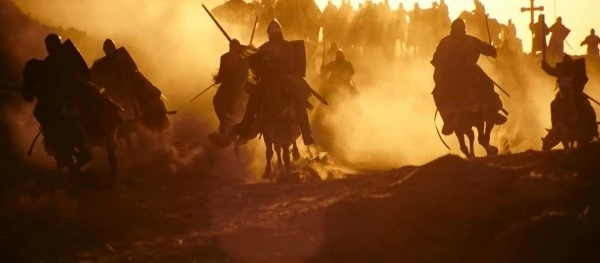
While Arn has been, one suspects, enjoying himself more than he might like to admit at the Crusades, Cecilia has had a far more miserable time of it, but, believing that Arn was killed with the other Templars, and receiving an unexpected offer, decides to take her final vows that will make her a nun for the rest of her life. Will Arn return in time to stop her?
In spite of having proved himself very good at it, Arn is now sick of war and wants only to live in peace. However, once back in Sweden, he finds himself dragged unwillingly into dynastic politics. He must put on his Templar's tabard for one last Battle...
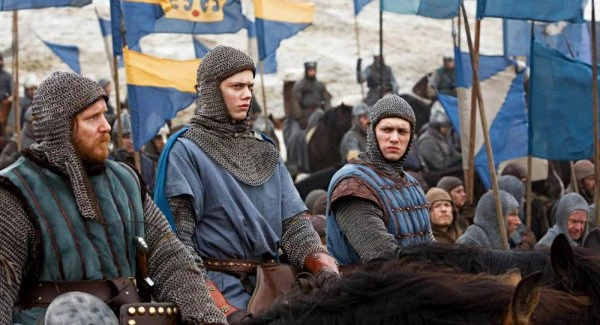
The Swedes assembled a strong, if slightly eclectic, international cast. Simon Callow is the kindly Abbot and Vincent Perez is Arn's military mentor at the Abbey where our young hero is educated. Steven Waddington is a Templar Grand Master who was in fact a Catalan.
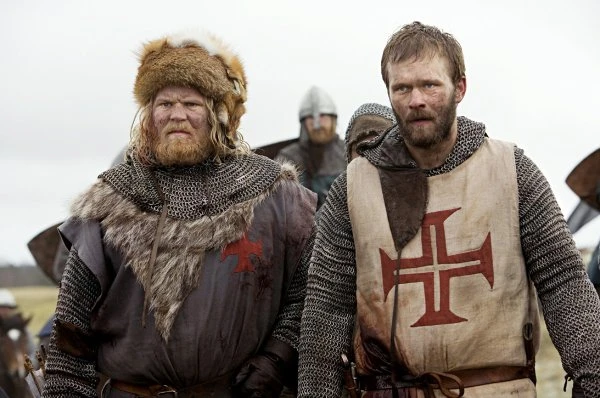
The series is, however, mainly a demonstration of the strength in depth of the Swedish acting profession. As usually happens in his projects, the cast is dominated by the great Stellan Skarsgard: he plays Arn's uncle, who is also the power behind the Throne of a King who was Arn's childhood friend - and is played by Gustaf Skarsgard, one of Stellan's sons who followed him into the business and who is now best known as Floki in 'Vikings.' The scenes between father and son have an interesting dynamic. Two of Stellan's other sons, Bill and Valter, have small roles as the sons of the King played by their elder brother. Someone obviously offered a family deal.
The lovely Sofia Helin is Cecilia, a self confident aristocrat a million miles from Helin's delightful oddball Saga Noren in The Bridge, and a woman for whom one can easily imagine a man waiting twenty years and crossing half the known world.
Ingmar Bergman's frequent collaborator Bibi Andersson is a nasty nun who is cruel to Cecilia. Sven-Bertil Taube, best known to English language viewers from 'The Eagle Has Landed,' 'Puppet on a Chain,' and Codename: Kyril, is an excessively political Bishop. Michael Nyqvist, who went on to find fame in 'The Girl With the Dragon Tattoo,' is Arn's father. Joel Kinnaman, who later made a big impact in 'Easy Money,' is a wicked King, or rather a King portrayed as wicked.
As Arn himself, Joakim Natterqvist is generally stoic and impassive, as befits a Nordic hero, but there are some scenes where his emotions come through and only the most hard hearted will not be moved by one in which he loses his beloved horse. Indeed, he seems more upset about that than about Cecilia, but then it is a great looking horse.
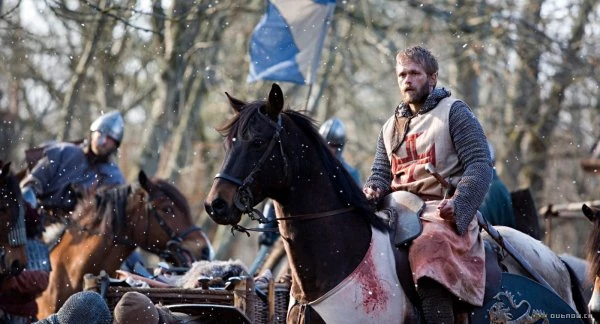
With all the money on display, the production values are superb. Location work in Sweden, Scotland, and Morocco - a frequent stand in for the Holy Land - combined with well researched props and sets give a credible landscape of the Middle Ages: if, the Swedes being the Swedes, everything looks a bit too clean and tidy, perhaps they were like that in the Middle Ages too.
The battle scenes are well staged. The build up to the big one at the end is obviously influenced by 'Braveheart,' while the actual fighting has more in common with Agincourt in 'Henry V.' It is fascinating to note how the Swedes seem to view the Norwegians in much the same way that the English view the Irish or the Welsh.
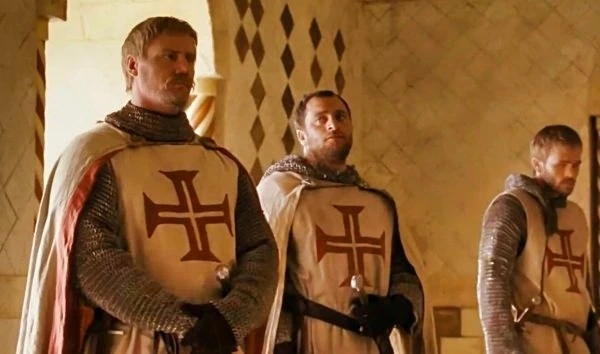
Apparently, Guillou, who dresses well to the left, wrote the original trilogy partly as a protest against what he saw as Western imperialism in the Middle East. If so, this aspect does not come across in the television adaptation, which seems to take a more traditionalist line. Unusually in recent years, at least before 'Knightfall,' the Knights Templars are presented sympathetically: Arn is shown defending the pilgrim routes, which was the original purpose of the Order. They did indeed fulfil this purpose, but, in the process they also built up considerable wealth and power - Arn is not shown doing that. The series takes a balanced view of the Church in general. So the nasty nun Andersson and the bad Bishop Taube are balanced by the agreeable Abbot Callow and the militant monk Perez. The point is well made that, overall, the Church was a definite force for peace and order in a generally disorderly land, as was the case in most parts of Europe at that time.
Although accurate in most respects, the production does take some big liberties with history. For example, there is some evidence to suggest that the villainous monarch played by Kinnaman was actually a good King. Of course, playing it that way would have undermined the whole plot and put the hero on the wrong side.
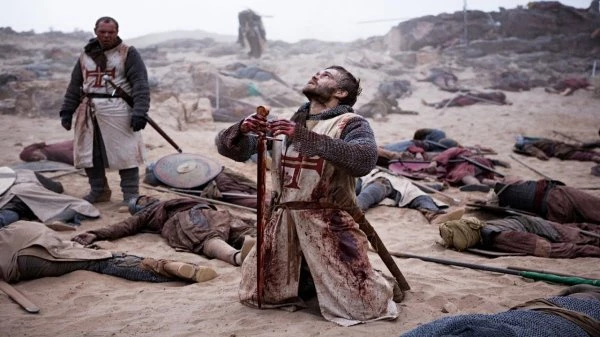
None of this detracts from the entertainment value of the show, which is considerable. It is a good old fashioned adventure story, with the classic "boy meets girl, boy loses girl, world explodes" formula. There is a reason why that formula has endured. The production and the acting are a credit to Sweden, where 'Arn the Knight Templar' was very much a prestige project. It succeeds much better as television series than was a film, or films because it immerses the viewer so well in an unfamiliar time and place that we find ourselves quite at home there and sorry when we have to leave.
Arn: The Knight Templar is available to purchase on DVD or download from Amazon Prime
Review by John Winterson Richards
John Winterson Richards is the author of the 'Xenophobe's Guide to the Welsh' and the 'Bluffer's Guide to Small Business,' both of which have been reprinted more than twenty times in English and translated into several other languages. He was editor of the latest Bluffer's Guide to Management and, as a freelance writer, has had over 500 commissioned articles published.
He is also the author of ‘How to Build Your Own Pyramid: A Practical Guide to Organisational Structures' and co-author of 'The Context of Christ: the History and Politics of Rome and Judea, 100 BC - 33 AD,' as well as the author of several novels under the name Charles Cromwell, all of which can be downloaded from Amazon. John has also written over 100 reviews for Television Heaven.
John's Website can be found here: John Winterson Richards
Books by John Winterson Richards:
Seen this show? How do you rate it?
Seen this show? How do you rate it?
Published on January 6th, 2021. Written by John Winterson Richards for Television Heaven.


